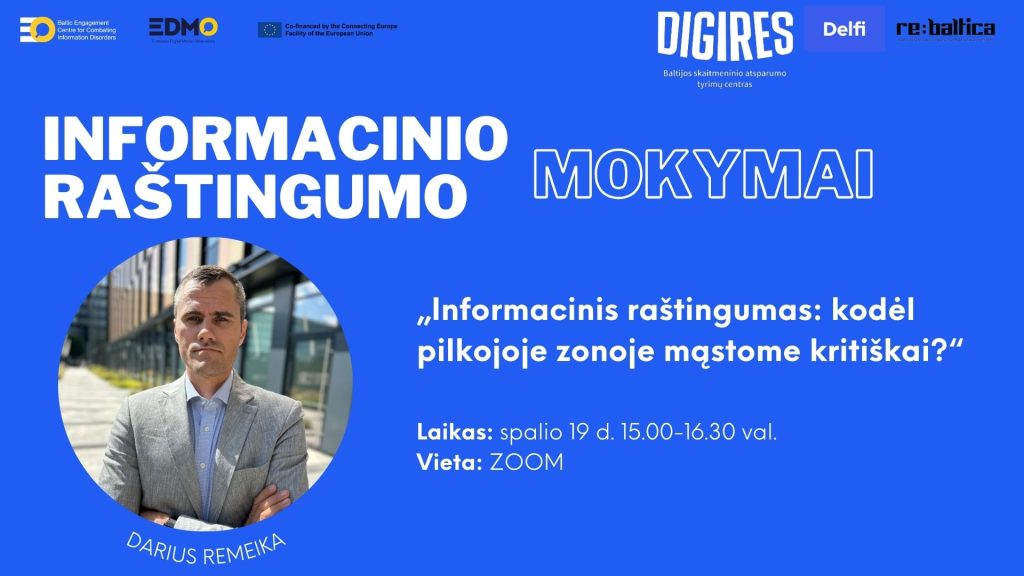 Back
Back

October 19th on the initiative of the BECID project, in which takes part DIGIRES, remote media literacy trainings were held in all three Baltic countries at the same time. Seminars were dedicated to teachers, librarians, youth workers and regional journalists. During the seminars in Lithuanian, Latvian and Estonian languages, the main focus was on the topics of disinformation, critical thinking and fact-checking.
In Lithuania, the seminar “Information literacy: why do we think critically in the gray zone?” was conducted by Darius Remeika, a member of the DIGIRES association, an expert in information and psychological operations and disinformation. During the training, he talked about one of the most common cognitive bias – dichotomous thinking, which unconsciously pushes society towards confrontation, polarization and hate speech.
“The main reason for the polarization of society is dichotomous thinking. We see things as black or white, good or bad. We see ourselves on the white side and view and judge others from this white perspective. Such thinking often leads to divisive communication and actions, for instance, we spread hate speech” said D. Remeika.
According to him, a quick answer equals a polarized answer, and critical thinking begins in the gray area. The good news is that critical thinking can be learned. “Let’s catch ourselves thinking polarized and ask ourselves – do I have factual evidence for this? Perhaps we will understand that at first glance white is actually light gray? Always think before communicating,” advised the specialist.
During the seminar, the participants also performed exercises aimed at strengthening resistance to manipulation and information disruptions, such as disinformation, fake news or propaganda, which are especially manifested in times of crisis and situations of uncertainty.
According to D. Remeika, people are most vulnerable in conditions of uncertainty, i.e. when there is more than one choice or we are at a crossroads. “People have a subconscious desire to control the future. When we do not know what awaits us, we cannot control the situation, we fall into the unknown. The more uncertainty there is in different areas of life, the worse we feel. In a situation of uncertainty, we need answers, so we start looking for them in the media, on the Internet. But we don’t necessarily reduce uncertainty – sometimes we only increase it by searching. In the face of crises, not verified information is almost always the first to appear, and in many cases it is disinformation. Creators and disseminators of disinformation always have an advantage over facts, because they create truths, interpretations and are always the first,” said D. Remeika.

According to him, fact-checking plays an important role in the fight against disinformation. But even when checking facts, we can make mistakes. Today, 250 cognitive bias have been discovered and defined in science. D. Remeika introduced the five most common when checking facts:
At the same time, seminars were held in Latvian and Estonian languages. During the seminar in Latvian, it was discussed why fact-checking is needed, the importance of the International Fact-Checking Network (IFCN), differences between opinions and facts were discussed, and fact-checking instruments were introduced. The Estonian-language seminar was dedicated to discussing why it is important to check the facts and what the negative consequences of false or misleading posts on social networks can be. The workshop also covered how to distinguish when content is harmful disinformation and when it’s just a joke.
The author of the publication – Kristina Berksun